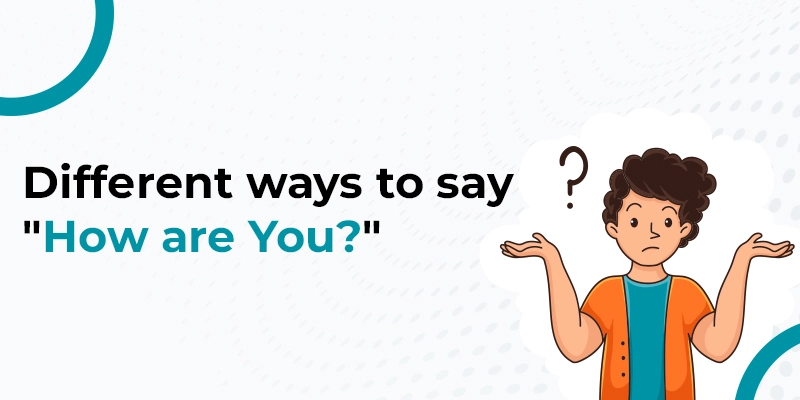
If you’re interested in speaking English with style, read on to discover different ways to greet someone at the start of a conversation. Greeting others is a crucial part of any interaction. There are numerous ways to greet the person you’re engaging with, and how you begin your conversation is essential for making it smooth and inviting. Healthy conversations always start with a warm welcome. Let’s explore various ways to initiate a conversation, which can help foster healthy relationships and enhance your soft skills. Spoken English Classes in Velachery help you upskill your English speaking abilities in a short time.
How do you greet others in English?
English greetings vary depending on the context where you apply them, such as formality and time of day. Here is a general breakdown of the classifications where we say, ‘How are you in different ways’.
Formal Greetings
- “Hello.” This is a standard, polite greeting suitable for almost any situation.
- “Good morning/afternoon/evening.” These greetings are used based on the time of day.
- “How do you do?” This is a very formal greeting, less common in everyday speech.
- “It’s nice to meet you.”, “Pleased to meet you.” Used when meeting someone for the first time.
Informal Greetings
- “Hi.” A common, casual greeting.
- “Hey.” More casual than “hi,” often used among friends.
- “What’s up?”/ “How’s it going?” Casual inquiries about someone’s well-being.
- “Morning/Afternoon/Evening.” less formal versions of the good morning etc.
- “How are you?” is a common greeting that can be used in formal as well as informal situations.
Alternate and Modern Considerations
- Regional variations exist in saying “how are you in english”. For example, “Howdy” is common in the Southern United States, and “G’day” is used in Australia.
- Slang greetings like “Yo” or “‘Sup” are informal and typically used among close friends.
- Body language plays a significant role in greetings, such as handshakes or nods.
The best greeting depends on who you’re talking to and the situation.
The similar-looking phrases
The choice of phrase you use often depends on your relationship with the person and the conversation context. Spoken English Classes in T Nagar provide good training to improve your communication skills. Some phrases, like “What’s up?” are very casual and best used with friends. Others, like “How are you doing?” can be used in a wider range of situations. “How have you been?” implies that there has been a period since you last saw the person. Using various phrases or “how are you synonyms” can make your casual conversations more engaging and show that you are genuinely interested in the other person’s well-being.
The Purpose Of Greeting Each Other In A Conversation
Greetings serve a fundamental social function, acting as the crucial first step in any interaction. Beyond simply acknowledging another person’s presence, greetings establish a foundation for communication, indicating a willingness to engage. Spoken English Classes in Anna Nagar enable you to learn to speak flawless English. They are a social lubricant, smoothing the transition into conversation and setting the tone for the following exchange. Whether formal or informal, greetings convey respect, recognition, and, often, a sense of connection. They allow us to gauge the other person’s mood, establish rapport, and navigate social dynamics. Moreover, greetings are deeply rooted in cultural norms, reflecting societal values and expectations. They can signal social status, familiarity, and the nature of individuals’ relationships. In essence, greeting is a vital social ritual that initiates human interaction, fostering a sense of community and facilitating meaningful communication.
How to ask How Are You in Different Ways?
It’s very useful to have a variety of ways to ask “how are you?” in English, as it helps you adapt to different social situations. EnglishLabs provides good training to improve both speaking and writing skills in English. Here’s a breakdown by context:
General/Everyday:
- “How are you doing?” (Slightly more formal)
- “How are things?” (General inquiry)
- “What’s up?” (Very informal, often among friends)
- “What’s new?” (Asking for recent updates)
After a Period of Time:
- “How have you been?” (Used when you haven’t seen someone in a while)
- “Long time no see!” (Followed by an inquiry about their well-being)
In a Specific Situation:
- “How’s your day going?” (Focuses on the present day)
- “Are you alright?” (Expresses concern, can also be a general greeting, especially in British English)
- “How are you feeling?” (More focused on emotional or physical well-being)
- “How are you holding up?” (Used when someone is going through a difficult time)
In a Professional Setting:
- “How are you today?” (Polite and professional)
- “I hope you’re having a good day.” (A more subtle way of acknowledging their well-being)
Slang/Very Informal:
- “‘Sup?” (Very casual, shortened version of “What’s up?”)
Key Points:
- Formality: Choose your phrase based on your relationship with the person and the context of the situation. Spoken english classes in Tambaram offer coaching to speak in English without any mistakes.
- Tone: Your voice tone can significantly impact how your question is perceived.
- Context: Your current situation will also dictate the appropriate phrase.
By using these variations, you can make your conversations more natural and engaging.
To conclude, developing communication and soft skills in any language is very important. This is especially true for English, a widely accepted global language that transcends borders and helps people connect. Spoken English Classes Chennai helps you improve your speaking skills in English. Given its significance, it is our responsibility to learn the basics of speaking English, which primarily includes greeting the person in front of you. If you are preparing for job interviews, personal interviews often begin with formal greetings. Therefore, learning to initiate a conversation and respond appropriately is equally important. Improving your daily conversations in English is essential, and familiarizing yourself with the general phrases mentioned above can significantly boost your confidence.



